Home » Archives for February 2014
Obama: Dad absent; I got high
Posted by Unknown
Give hero Marine his Medal of Honor
Posted by Unknown
Editor's note: Ruben Navarrette is a CNN contributor and a nationally syndicated columnist with the Washington Post Writers Group. Follow him on Twitter: @rubennavarrette
(CNN) -- Why only reach back to right a wrong from a half-century ago? Why not correct a travesty that is occurring right now?
I direct this question to President Barack Obama, who in March will award the Medal of Honor -- the nation's highest military honor for valor -- to a group of 24 veterans, only three still living, who should have been given the commendation decades ago. The men, who served over three wars, performed as heroes on the battlefield. But for 19 of the 24, the nation failed them. They had been passed over because of discrimination in the ranks.
The belated recognition is a wonderful gesture. But there is something more Obama should do.
 Ruben Navarrette Jr.
Ruben Navarrette Jr. The nation owes a Medal of Honor to Sgt. Rafael Peralta, a 25-year-old Marine from San Diego who died on November 15, 2004, when, according to many accounts, he smothered a grenade in Falluja, Iraq. He came to the United States as an immigrant from Mexico, and joined the Marines on the day he received his green card.
Absorbing a grenade blast to save other soldiers is the very definition of valor. It all but guarantees the Medal of Honor.
This was true for three other heroes: 22-year-old Marine Cpl. Jason L. Dunham, who died this way on April 22, 2004, in Karabilah, Iraq; 19-year-old Army Pvt. Ross McGinnis, who died in Baghdad on December 4, 2006; and 25-year-old Navy SEAL Michael A. Monsoor, who died in Ramadi, Iraq, on September 29, 2006.
In Peralta's case, before the Marine covered the grenade, he had been shot in the head. And that fact fuels a debate.
There are those who believe that Peralta should not receive the Medal of Honor, claiming that the gunshot killed him instantly, and so he was already dead when he covered the grenade. That would make the smothering of the explosive an involuntary action that would not constitute heroism.
That group includes the last three secretaries of defense.
Recently, the Pentagon announced that it will not reopen the nomination for Peralta. According to a news release, Defense Secretary Chuck Hagel and the Defense Department concluded that the evidence did not meet the "beyond a reasonable doubt" standard necessary for the Medal of Honor.
Nevertheless, many disagree. Those who think that Peralta should get the Medal of Honor acknowledge that the Marine sergeant was shot but, point to assertions by a neurologist, two neurosurgeons and the surgeon for Peralta's battalion that the bullet was traveling at such a low velocity that it did not kill him instantly. They assert that he was able to reach out, scoop up the grenade, and place it under his body. That it was a conscious decision to give up his life to save comrades, and that it does amount to heroism.
I've looked at this case for several years and written about it numerous times. I'm in Camp No.2. I believe Peralta deserves the Medal of Honor.
This is also the point of view of the entire California congressional delegation, which pushed the Pentagon for years to reopen the nomination. (Republican Rep. Duncan Hunter, himself a Marine combat veteran who presumably knows a thing or two about valor, led the push.) And it's also the view of Texas pathologist Vincent Di Maio, an independent forensic expert who looked at the evidence and reached a different conclusion than the one arrived at by the Pentagon. And, it's the opinion of the Marine Corps, the U.S. Navy and U.S. Central Command.
Furthermore, it is also the point of view of the real experts on what happened that day in Falluja: Peralta's comrades in Alpha Company, most of who joined the campaign for the Medal of Honor. They were there. And they don't need some bureaucrat behind a desk in Washington or some political appointee to tell them what happened. They saw it with their own eyes. Initially, all seven said they witnessed Peralta scoop up the grenade and sacrifice himself, and that it's because of that act of valor that they came home to their families, to weddings and children's birthday parties and anniversaries
 W.H. to bestow highest honor to 24 vets
W.H. to bestow highest honor to 24 vets But the Washington Post last week reported that two former Marines who were with Peralta on the day he died have broken ranks with their colleagues. At least one is recanting his earlier statements. The two former Marines claim that the narrative about what happened that day advanced by the other Marines is not true, and that it was concocted by the rest of the squad to honor Peralta's memory.
They insist that the grenade exploded near Peralta but not underneath him. One of the former Marines, 30-year-old Davi Allen, who was close enough to Peralta to be wounded in the blast, spent years advancing the other version, and now he claims the new version is the truth. Was he not telling the truth then, or is he not telling it now?
Both Rep. Hunter and the Peralta family have challenged the Washington Post article, which they insist contains inaccuracies and factual omissions. While admitting in a letter to the Post that the eyewitness accounts "have always differed," Hunter accused the newspaper of ignoring "the full body of evidence" and inaccurately describing the situation that day in Falluja. Moreover, according to Politico, the allegation that Peralta's fellow Marines concocted an alternate narrative had already been reported in the Marine Corps Times. Yet a colonel assigned to investigate the case found no evidence to back up that claim.
It comes down to whom you believe. This much everyone seems to agree on: Those in the Corps used to call Peralta "a Marine's Marine." It sounds like it.
There is one more member of the Peralta Fan Club, an expected one: The Pentagon. In 2008, as pressure started to mount, Defense Secretary Robert Gates offered the Peralta family a consolation prize: the Navy Cross. The citation read: "Without hesitation and with complete disregard for his own personal safety, Sgt. Peralta reached out and pulled the grenade to his body.
That's right -- the very thing that his supporters have insisted all along. So the Defense Department adopts different narratives depending on the commendation? That makes no sense.
The Peralta family turned down the Navy Cross, and held out for the Medal of Honor. It never came.
President Obama, you don't have to look back a half-century to find a miscarriage of justice in our armed forces. Here is a perfect example. Now, do the right thing, and give a hero the recognition he deserves.
Follow us on Twitter @CNNOpinion.
Join us on Facebook/CNNOpinion.
Spike Lee missed the point
Posted by Unknown
Editor's note: Errol Louis is the host of "Inside City Hall," a nightly political show on NY1, a New York all-news channel.
(CNN) -- There was an important kernel of truth buried in director Spike Lee's recent tirade against gentrification. New York City, like other big cities, has experienced a decades-long economic squeeze in which the cost of housing has soared while wage levels dropped, leaving middle-class families feeling pinched, punished and pushed out.
Lee's 10-minute, obscenity-laced rant about changes in his old Brooklyn neighborhood, Fort Greene, was deliberately offensive and, at times, incendiary (you can listen to it -- uncut -- here). He accused white newcomers to the area of being rude and disrespectful of local culture. And in this defense of Fort Greene, he sounds somewhat neighborly -- New York could always use a few more polite people -- until you think about it for a minute.
Who, exactly, determines what the local culture is? To whom is this deference or "respect" supposed to be rendered, and how? When can the "respect" bill be considered paid in full?
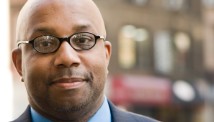 Errol Louis
Errol Louis And whatever happened to the idea that law-abiding citizens in a free society should be able to walk their dogs in the park, take yoga classes, sip overpriced coffee at the local café and otherwise go about their business without having their lifestyle choices judged, ridiculed or attacked?
Also, as I've noted elsewhere, it doesn't help Lee's case that he sold his own home for $1 million in the late 1990s and decamped to the wealthy Upper East Side of Manhattan, where he currently resides in a 9,000-square-foot palace that he bought in 2006 for $16 million and recently put on the market with a $32 million asking price. This is a man who made a fortune by promoting the hipness of black Brooklyn, relentlessly and profitably spurring on the very gentrification he now decries.
There was a better point Lee could've made.
The real phenomenon of gentrification worth talking about is a national crisis of housing costs that are climbing faster than the earning power of many residents. It's not confined to black neighborhoods, and it's happening all around the country, not just in New York.
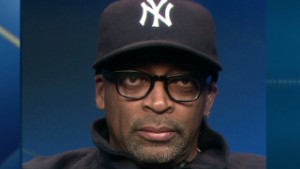 Spike Lee rips NYC gentrification
Spike Lee rips NYC gentrification 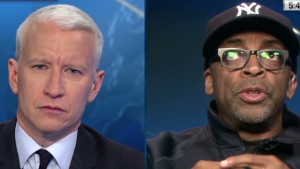 Spike Lee on gentrification
Spike Lee on gentrification In a fascinating report, Daniel Hartley, a research economist at the Federal Reserve Bank of Cleveland, examined metropolitan areas to measure the number of census tracts where the housing prices moved from the lower half to the top half for that area.
Between 2000 and 2007, Hartley found, housing prices made that leap in 61% of Boston -- the most spectacular increase of any big city. Seattle ranked second, with 55% of the city's census tracts with low-cost housing moving into the pricier bracket. New York, came in third, with 46% of the city's cheaper housing turning not so cheap.
Hartley's price-based measurement of gentrification makes far more sense than racially charged anecdotal observations from Lee. Looking at these kinds of hard numbers also reveals that, in many cities, gentrification takes place without an ethnic shift. It's middle-class black homesteaders who are gentrifying the Bronzeville section of Chicago, for example. And South Boston is going upscale while remaining an Irish-Catholic bastion.
What makes gentrification a problem is that earning power for most people isn't keeping up with the rising cost of buying or renting a place to live. In New York, the cost of renting an apartment jumped 8.6% between 2007 and 2011 -- and in those same years, median household income dropped nearly 7%, according to a report by New York University's Furman Center for Real Estate.
That gap between income and rent is the true crisis of gentrification -- and to fix it will require going beyond ethnic and racial finger-pointing.
What we need is a national campaign to ensure that middle-class wages keep pace with the cost of necessities like food, health care and shelter. It won't make headlines like Spike's rant, but it might replace the heat of blame and resentment with the light of solutions.
Follow us on Twitter @CNNOpinion.
Join us on Facebook/CNNOpinion.
Older dad: I risked it and it was worth it
Posted by Unknown
Editor's note: Philip Lerman is the author of "Dadditude: How a Real Man Became a Real Dad."
(CNN) -- You know, it's not like older fathers don't have enough to deal with.
We have to keep that smile on our faces when the school's reading adviser mistakes us for our son's grandfather.
We have to pretend not to notice how much more hair all the other dads have, how much younger their wives are and how much more well-equipped they are to coach the soccer team. That's because when they were kids, they actually played soccer, while we grew up with more '60s-like pursuits, such as baseball, stickball and smoking dope.
We have to listen to people saying we're too old to keep up with our own kids, and we have to deal with the fact that they're absolutely correct.
 Philip Lerman
Philip Lerman But on top of all that, every two years or so, we have to deal with another study saying that we're much more likely to produce children who have Asperger's syndrome, attention deficit disorder, bipolar disorder and every other mental illness this side of mogo on the go go. (And we have to deal with the fact that all of the fathers of our kids' friends are way too young to catch W.C. Fields references such as "mogo on the gogo.")
Study: Children of older dads at higher risk of psychiatric disorders
A report published this week in JAMA Psychiatry confirmed this trend. It is a huge study of data about 2.6 million Swedish-born children and reveals that a guy like me, who became a father at 45 (I was 46, actually), would be three or four times more likely to have a child with autism spectrum disorder.
But look.
When Max was born, they told me that because of my age, he was much more likely to have autism than, say, the child of a guy who hadn't had his first prostate exam yet. They ran me through all the other things that could go wrong, which gave me great pause. It's terrible, of course, to think that we older fathers are putting our children's health at risk.
Until you think about the alternative -- not having them at all. Then it gets tricky, doesn't it
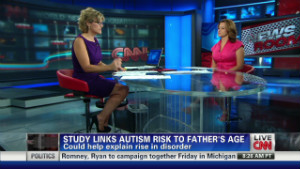 Older fathers may be linked to autism
Older fathers may be linked to autism Max has so far managed to survive my dotage and reach the sixth grade. I'm writing quickly because I like to be done with work at 3:30, when he gets home from school, so we can play a little catch or pingpong or even kick around a soccer ball before he starts on his homework. The thought that I might have listened to the scolds who chastised me for daring to think about having a child in my advanced years -- the thought that this boy might not have come into my life -- is utterly beyond my comprehension.
I shudder to even think of Max never having been born -- and because I am a neurotic old Jew, I have to spit on the ground three times for even having written the words, like God will do whatever terrible things to us that we think or say, but then we spit three times he says, "Oh, well, that's much better then." Where did we come up with this stuff?
As it turns out, Max does suffer from some anxiety disorder issues. Did he inherit them from me? Were they caused by my creaky old decrepit sperm, as the studies suggest, or the cultural heritage that had him born to a father so neurotic that he made his son wear a football helmet to go on the swings? Or is it just one of those things?
I have no idea. But I do know this: He is lucky to have me for a dad.
He is lucky not despite my age but because of it. Because I am old enough to be done with the workplace striving that used to keep me in the office until way past what would have been his bedtime, had he existed then. Because I'm content to work from home, for a much lower salary, so that I can be here to have that catch. To play that game of pingpong. And to counsel him and console him and help him come up with strategies when the anxiety gets to be too great.
And yes, because I have worked all my life and am financially secure enough to get him the help that he needs -- to have him in a school that has responded incredibly well to his disorder. To find the best therapist in the world.
And most importantly, he is lucky because I am old enough to give my son what I could never have given him when I was younger: patience.
Older dads are more patient, I think, because we know we will probably never go through all this again. We know that these precious moments -- the bottles that gave way to sippy cups, the swings that gave way to skateboards, the Wiggles that gave way to Daft Punk -- these moments are golden gifts from God, and we understand that in a way that we never could have, in our salad days.
And so we cherish them, and we savor them, and we believe that spending that time down on the floor when they are little, and in the backyard while they are growing, and at the table talking when they need us to be at the table talking, makes all the difference in the world. All the difference in their world, and in our own.
Hey JAMA -- go study that for a change.
Follow us on Twitter @CNNOpinion.
Join us on Facebook.com/CNNOpinion.
Obama's new 'change we can believe in'
Posted by Unknown
Editor's note: LZ Granderson writes a weekly column for CNN.com. A senior writer for ESPN and lecturer at Northwestern University, the former Hechinger Institute fellow has had his commentary recognized by the Online News Association, the National Association of Black Journalists and the National Lesbian and Gay Journalists Association. Follow him on Twitter @locs_n_laughs.
(CNN) -- In the fall of 1995, I jumped into a large van with about 20 other young black men, and we headed out from the small college town of Kalamazoo, Michigan, to Washington.
Destination: the Million Man March.
The mission: addressing the ills crippling black men.
 LZ Granderson
LZ Granderson We were an intellectually curious and rambunctious group. Loud, idealistic Gen Xers, raised on the sweet nectar of Public Enemy's message of personal responsibility and the films of Spike Lee that encouraged us to fight the power. So convinced that this event was going to change the world that when we turned on the radio, and McFadden and Whitehead's "Ain't No Stopping Us Now" came on, I took the song as providence.
Nearly 20 years later and I'm sure I don't need to rattle off all of the discouraging statistics regarding men of color in this country to illustrate that moment was anything but the awakening it was designed to be.
Yet I sat Thursday in the East Room of the White House -- listening to President Barack Obama as he announced his "My Brother's Keeper" initiative, looking at the young men who stood on risers behind him, listening to the affirmative audibles of the attendants, like the congregation of a Southern Baptist church -- and I found myself fondly reminiscing. I found myself inspired.
When I first came to Washington to address the unique circumstances hindering men of color, it was with a megaphone shouting at the White House. On this day, I was in the White House, and the megaphone had been replaced with a microphone clipped to a podium that bears the seal of the President.
Progress.
Afterward I was asked if I thought this initiative would make a difference.
My answer was yes.
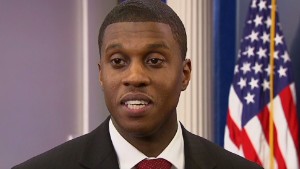 'The President cares, he's invested'
'The President cares, he's invested' 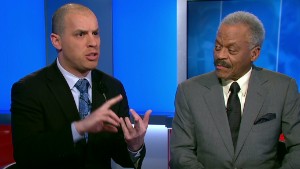 Is gangsta culture to blame?
Is gangsta culture to blame? 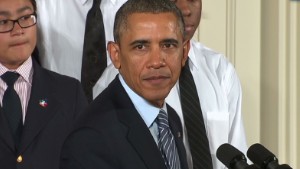 Obama: Dad was absent; I got high
Obama: Dad was absent; I got high True, the cynic will look at the laundry list of already created programs -- locally and nationally -- that were designed to dismantle the debilitating factors that have plagued men of color over the years, look at "Keeper" and shrug.
Others will accuse Obama of promoting division by using the office to highlight the issues of minorities over those of their white counterparts. As if one in three black males being projected to go to prison at some point in their lives can be construed as some sort of highlight.
But such is the world of the first black President of these United States.
Obama spent the first five years of his administration cautiously touching on the issue of race -- a beer summit here, a hypothetical "son" in the wake of the killing of Trayvon Martin there -- likely for fear of being perceived as only caring about the needs of "his people" as opposed to "the people."
As a result, he has been the target of sharp criticism from some within the black community who see him aggressively addressing the pain of the lesbian, gay, bisexual, and transgender community, or tackling issues such as immigration that greatly affect Latinos, and they wonder what about us?
What about our pain?
The wealth of black households has declined more than any other demographic during Obama's time as President and those hurt most by this wonder: What about us?
Blood continues to flow and bullets fly in the neighborhood streets he calls home and the residents wonder, what ... about ... us?
Thursday he said, I hear you.
I was asked if that would make a difference.
My answer is yes.
Obama's address was not about government.
It was about community.
His community, which is my community, which is your community.
For as much as the narrative has historically reflected a storyline framed around the troubles of one section of society, the reality is no section is immune economically from the effects of this crisis.
Men of color are more prone to drop out of high school than anyone else.
A majority of inmates lack a high school diploma.
In a 21-year span ending in 2003, the amount of money spent on prisons increased by 570%.
That money comes from taxes.
Dots connected.
Not to mention the loss of workers and the well-documented effects of unplanned pregnancies coupled with absentee fathers.
And when news reports of young men dying from gang violence no longer elicit an emotional response -- a sad reality the President talked about -- we are indeed in a moral crisis.
Will "Keeper" make a difference?.
Yes.
Whether Obama is freed from the need to appease now that he's in his second term or driven by the urgency of the moment, the forming of "My Brother's Keeper" is the most tangible manifestation of his "Change We Can Believe In" slogan in years. And while $200 million promised by various corporations and philanthropic groups is but a "drop in the bucket" in terms of the resources needed -- as one of his critics, Tavis Smiley, pointed out soon thereafter -- the fact he was able to raise that amount quietly is an indication that addressing this crisis has been on his mind for some time.
Even if he was hesitant to talk about it.
Michael Cruz, a local student involved in an education supplemental program called Communities in Schools, was one of those young men standing on the risers behind the president. He spoke to me about what it was like to spend time with Obama and how he has already been encouraged by what the President wants to do.
"People are always trying to bring your self-esteem down," the 16-year-old from Washington told me. "I have neighbors and kids in school telling me that I won't turn out to be anything and stuff like that.
"Some parts of my neighborhood are good and some parts people are doing drugs and stuff like that. But I try not to pay any attention to them and stay focused on my goals."
Goals that include going to college and becoming a chemical engineer.
Over the past two days, he has gotten to know Michael Carter, a 15-year-old at his school. While Cruz has two parents in the home, Carter said he is raised by his mother and gets support from his aunts and cousins who help him stay out of trouble.
"Getting to know Michael has been a great experience because he has goals like I do," Carter said. "I didn't know him before, but now that I have, we've become good friends. I know I will do all I can to encourage him and help him because seeing him do well will inspire me to do well."
Carter, who wants to attend Syracuse University and major in computer science, is his brother's keeper.
And so if you saw the President's address or read some of his remarks and wonder if it would make a difference ...
First think of Cruz and Carter and invariably your answer will be yes.
Follow us on Twitter @CNNOpinion.
Join us on Facebook.com/CNNOpinion.
How to lower your teen's stress
Posted by Unknown
Editor's note: Kelly Wallace is CNN's digital correspondent and editor-at-large covering family, career and life. Read her other columns and follow her reports at CNN Parents and on Twitter.
(CNN) -- Ask parents of teens if their children are more stressed than they were at the same age, and they'll usually tell you, "Absolutely."
"I went to a high school that at the time was considered one of the 10 best high schools in the country, and I think in high school I had less advanced work than they have now," said Nancy Friedman of New York, referring to her 13-year-old twins,
"They are writing real research papers ... much more is expected of them," said Friedman, who is co-founder of a video sharing platform for tweens called KidzVuz.
Teens are feeling the pressure of more demanding curriculum, longer homework sessions, high-stakes testing and more competitive college admissions, according to a new poll.
The poll, conducted by NPR along with the Robert Wood Johnson Foundation and the Harvard School of Public Health, found that nearly 40% of parents said their high school kids are experiencing a lot of stress from school.
"They have to do their AP (advanced placement) work, they have to be in honors classes, and it's not just enough to be in them, but they have to excel," said Jaclyn Bealer, who spends her summers training teens to be counselors at a camp in Branchville, New Jersey.
"They're just putting so much pressure on themselves to get the absolute best grade possible, and anything under a 90% is failure," said Bealer.
 Generation stressed: teens boiling over
Generation stressed: teens boiling over 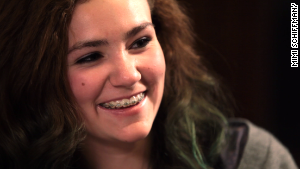 Talking to teens about social media
Talking to teens about social media  How 'selfies' can boost self-confidence
How 'selfies' can boost self-confidence 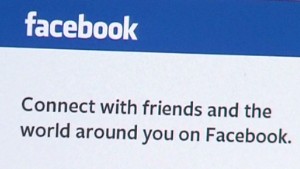 Schools to monitor student social media
Schools to monitor student social media  D.A. warns parents about Ask.fm
D.A. warns parents about Ask.fm  Are these sexy selfies too far for kids?
Are these sexy selfies too far for kids? Friedman, the mom of twins, knows that firsthand. Her daughter Rachel "literally will be upset if she gets a 98 instead of 100 on something," she said during a family interview at her home.
"I do not like getting below a 100," Rachel admitted with a laugh.
Social media adds to the stress
Today's teens, unlike when I was growing up, can now compare their academic performance and everything else about their existence to other teens 24 hours a day through updates on Facebook, Twitter, Snapchat, you name the social network, and that only increases the stress.
"Back in the day, we got a break from our peers after school and on the weekends, but now kids are on social media all day long," said Linda Esposito, a licensed clinical social worker and psychotherapist in Los Angeles and host of a blog on psychotherapy called Talk Therapy Biz.
READ: The upside of selfies: Social media isn't all bad for kids
Daniel Goleman, a psychologist and author of the New York Times best-seller "Emotional Intelligence," says all the social media and advanced technology mean more distractions for kids and less time to truly unplug.
"It used to be that children had time to look at clouds and imagine," said Goleman, whose latest book is "Focus: The Hidden Driver of Excellence." "Now they're looking at video games and are competing with some kid in Hong Kong."
Pressure from parents
Teens aren't just feeling stress from academic pressures. Their schedules are also filled with activities and sports after school and on weekends, raising questions for us parents about whether our children are overscheduled and whether we, as parents, are pushing them to do too much.
"There's a little fallacy that we have to enrich our children's experience with every kind of lesson and every kind of sport and every kind of club, and that backfires at a certain point," said Goleman.
Parents who want the best for their kids get into trouble when it becomes like "over-wanting," said Ben Bernstein, a stress psychologist and author of "A Teen's Guide to Success: How to be Calm, Confident & Focused" as well as a book about stress-reduction techniques for test-taking.
READ: How not to be a scary stage parent
"It could be their own self-esteem is tied into that. It could be that they didn't have the kind of chances that their child had," said Bernstein, who says parents sometimes also have their own hopes and goals for their child that might not mesh with what the child wants to do.
"In that sense, they lose touch with what is happening with their kid," he said.
Bealer, the camp supervisor, says plenty of teens feel like their parents don't give them space to be themselves.
"One of the biggest things that I hear is kids don't necessarily feel that they're being listened to, and that they're being told a lot of what to do," she said.
What they get at camp, she says, is "just having someone to listen to them and not judge them for maybe what their dreams may be or what they're worried about, not minimalizing their worries."
Parents also contribute to their teens' stress by not figuring out how to cope with their own stress, said Lori Lite, who created the parenting site Stress Free Kids after the stresses of parenting were starting to make her sick.
"Many parents demonstrate unhealthy coping mechanisms and live a full-blown stressed out lifestyle," said Lite. "Teens learn and internalize these messages."
READ: Overscheduled kids, anxious parents
How to lower the stress
 CNN's Kelly Wallace talked to parents, teens, psychologists and other experts about why our teens are feeling so stressed.
CNN's Kelly Wallace talked to parents, teens, psychologists and other experts about why our teens are feeling so stressed. Now that we know some of the reasons why our teens may be feeling more stressed out than we did as kids, what can we do about it?
We asked CNN's Facebook community and received a ton of great tips included in the gallery above, everything from Merin Dahlerbruch of Rancho Palos Verdes, California encouraging her 17-year-old to pick up a trumpet to Traci Garcia of Harwood Heights, Illinois, giving her daughter a facial.
We also heard a lot about teaching our children how to relax, through breathing exercises and meditation.
In fact, several schools, including one in San Francisco, have adopted what's called "quiet time," during which students meditate for 10 to 15 minutes in the morning and again in the afternoon. Some schools that have implemented the new approach report a decline in absences and suspensions, and an increase in test scores.
READ: Managing your child's stress
"Regardless of socioeconomic status or race or the type of school, public or private, I think that kids in general need to be taught how to relax, how to breathe appropriately to calm themselves, how to recognize the signs of stress," said Esposito, who uses mindfulness exercises with many of her patients.
Lite, the founder of Stress Free Kids, is a big proponent of breathing, relaxation and visualization exercises for parents and children.
When her daughter went to high school, she said, the principal "began to brag" about the amount of stress teens would experience as freshmen. Her husband wrote her a note asking, "Are they going to teach them how to manage the stress?" she told me.
Stay in touch! Don't miss out on the conversation we're having at CNN Living. Follow us on Twitter and Facebook for the latest stories and tell us what's influencing your life.That's when Lite decided to create a CD for teens to help them manage anxiety and stress.
"If you watch teens take tests or you watch them play video games, if you watch carefully, you will also see them stop breathing," said Bernstein, the stress expert.
"Teaching kids to be calmer in their body by breathing, by learning how to keep themselves grounded, simple techniques of meditation ... things that we know work in terms of stress reduction, we should be teaching that stuff in school and parents should be doing it."
Follow Kelly Wallace on Twitter, and like CNN Living on Facebook.
Do we need a #hotJesus?
Posted by Unknown
Editor's note: Carol Costello anchors the 9 to 11 a.m. ET edition of CNN's "Newsroom" each weekday. Watch at 9:40 a.m. ET Thursday for a discussion of the new film about Jesus.
(CNN) -- Clearly Jesus was sexy.
After all, He is the Son of God.
I don't mean to be disrespectful, but as I watched the trailer for the new movie, "Son of God," I found myself gawking at the actor portraying Jesus.
 Carol Costello
Carol Costello Diogo Morgado is one hot dude. His Jesus looks more like Brad Pitt than that nice man with the beard in all those paintings.
I'm not the only one gawking at Morgodo's Jesus. He inspired the hashtag, "#HotJesus". It went viral on Twitter. The actor told The New York Times he doesn't want his looks to distract from the movie, but, "If the message of Jesus was love, hope and compassion, and I can bring that to more people by being a more appealing Jesus, I am happy with that."
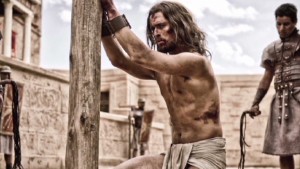 'Sexy' Jesus heats up new film
'Sexy' Jesus heats up new film Clearly we have a new trend. A "more appealing" Jesus is not just a better prophet, he's ... sexy.
We actually don't know what Jesus looked like. We do know he was a carpenter, so perhaps Jesus was buff.
But, I don't think when the Biblical Nathaniel asked, "Nazareth! Can anything good come from there?" and Phillip answered, "Come and see," they were talking about Jesus' beautiful face or chiseled abs.
Yes, Jesus, as portrayed in countless paintings, has a six-pack. As comedian and author, Greg Behrendt joked, "I'd like to get ripped ... ripped like Jesus. Jesus was ripped. You've seen the pictures, right? He's ripped! Ripped. He's the son of God. He's not going to be walking around saying I've got back fat today, I'm so puffy."
All joking aside, why must Jesus be sexy? Or ripped? Or even handsome?
The Rev. Robert B. Lawton, SJ, a Jesuit priest and former president of Loyola Marymount University, says, "There is absolutely no indication that Jesus was good-looking and sexy. In fact there is a passage in the prophet Isaiah that is taken as referring to Jesus. It says this:
"He had no form or majesty that we should look at him/nothing in his appearance that we should desire him. He was despised and rejected by others; a man of suffering and acquainted with infirmity; and as one from whom others hide their faces he was despised, and we held him of no account." (Isaiah 53. 2-3.)
While this might not be conclusive evidence, it's quite possible that Jesus was no Jewish Brad Pitt from Palestine.
On the other hand, why wouldn't God create a perfect Son?
"Anything that is sexy is going to attract people. People who might not go to the movie might want to check it out, particularly non-Christians," says the Rev. Lisa Jenkins, senior pastor of St. Matthew's Baptist Church in Harlem. "I don't see a problem with Jesus being attractive given our cultural context," she says. "I don't recall a Jesus who was not appealing to the eye. That's Hollywood." Jenkins is more concerned about what she considers an inaccurate portrayal of Jesus' ethnicity.
The Rev. James Martin, SJ, editor-at-large for America Magazine, and author of the coming book, "Jesus: A Pilgrimage," agrees. "God did not choose to incarnate himself in Laguna Beach," he says. "He chose to incarnate Himself at a certain place, at a certain time in a certain person." And that person was a Palestinian Jew.
"Many people have a hard time with the humanity of Jesus ... the closer He is to human physical perfection, the easier it is for some to accept Him."
But, Martin says, there is a danger in that too. A physically perfect Jesus makes Him into a God pretending to be man. When Jesus was both human and divine.
"He was like us in all things, except sin, as the theology goes," Martin says. "That means, He had a body, He got sick, He got tired, He may have sprained an ankle or two. There are passages in the Gospel showing Him falling asleep because He was tired. We tend to airbrush the physical imperfections away."
Those traits make Jesus so much more accessible. So much more ... human.
I tried to come up with a living person to compare to Jesus. That, of course, is impossible. The closest I can come, as a Catholic, is Pope Francis. I've grown to revere him.
Is it because he's sexy?
In a word: No.
Follow us on Twitter @CNNOpinion.
Join us on Facebook/CNNOpinion.
Does Jesus need a perfect body?
Posted by Unknown
Editor's note: Carol Costello anchors the 9 to 11 a.m. ET edition of CNN's "Newsroom" each weekday. Watch at 9:40 a.m. ET Thursday for a discussion of the new film about Jesus.
(CNN) -- Clearly Jesus was sexy.
After all, He is the Son of God.
I don't mean to be disrespectful, but as I watched the trailer for the new movie, "Son of God," I found myself gawking at the actor portraying Jesus.
 Carol Costello
Carol Costello Diogo Morgado is one hot dude. His Jesus looks more like Brad Pitt than that nice man with the beard in all those paintings.
I'm not the only one gawking at Morgodo's Jesus. He inspired the hashtag, "#HotJesus". It went viral on Twitter. The actor told The New York Times he doesn't want his looks to distract from the movie, but, "If the message of Jesus was love, hope and compassion, and I can bring that to more people by being a more appealing Jesus, I am happy with that."
 'Sexy' Jesus heats up new film
'Sexy' Jesus heats up new film Clearly we have a new trend. A "more appealing" Jesus is not just a better prophet, he's ... sexy.
We actually don't know what Jesus looked like. We do know he was a carpenter, so perhaps Jesus was buff.
But, I don't think when the Biblical Nathaniel asked, "Nazareth! Can anything good come from there?" and Phillip answered, "Come and see," they were talking about Jesus' beautiful face or chiseled abs.
Yes, Jesus, as portrayed in countless paintings, has a six-pack. As comedian and author, Greg Behrendt joked, "I'd like to get ripped ... ripped like Jesus. Jesus was ripped. You've seen the pictures, right? He's ripped! Ripped. He's the son of God. He's not going to be walking around saying I've got back fat today, I'm so puffy."
All joking aside, why must Jesus be sexy? Or ripped? Or even handsome?
The Rev. Robert B. Lawton, SJ, a Jesuit priest and former president of Loyola Marymount University, says, "There is absolutely no indication that Jesus was good-looking and sexy. In fact there is a passage in the prophet Isaiah that is taken as referring to Jesus. It says this:
"He had no form or majesty that we should look at him/nothing in his appearance that we should desire him. He was despised and rejected by others; a man of suffering and acquainted with infirmity; and as one from whom others hide their faces he was despised, and we held him of no account." (Isaiah 53. 2-3.)
While this might not be conclusive evidence, it's quite possible that Jesus was no Jewish Brad Pitt from Palestine.
On the other hand, why wouldn't God create a perfect Son?
"Anything that is sexy is going to attract people. People who might not go to the movie might want to check it out, particularly non-Christians," says the Rev. Lisa Jenkins, senior pastor of St. Matthew's Baptist Church in Harlem. "I don't see a problem with Jesus being attractive given our cultural context," she says. "I don't recall a Jesus who was not appealing to the eye. That's Hollywood." Jenkins is more concerned about what she considers an inaccurate portrayal of Jesus' ethnicity.
The Rev. James Martin, SJ, editor-at-large for America Magazine, and author of the coming book, "Jesus: A Pilgrimage," agrees. "God did not choose to incarnate himself in Laguna Beach," he says. "He chose to incarnate Himself at a certain place, at a certain time in a certain person." And that person was a Palestinian Jew.
"Many people have a hard time with the humanity of Jesus ... the closer He is to human physical perfection, the easier it is for some to accept Him."
But, Martin says, there is a danger in that too. A physically perfect Jesus makes Him into a God pretending to be man. When Jesus was both human and divine.
"He was like us in all things, except sin, as the theology goes," Martin says. "That means, He had a body, He got sick, He got tired, He may have sprained an ankle or two. There are passages in the Gospel showing Him falling asleep because He was tired. We tend to airbrush the physical imperfections away."
Those traits make Jesus so much more accessible. So much more ... human.
I tried to come up with a living person to compare to Jesus. That, of course, is impossible. The closest I can come, as a Catholic, is Pope Francis. I've grown to revere him.
Is it because he's sexy?
In a word: No.
Follow us on Twitter @CNNOpinion.
Join us on Facebook/CNNOpinion.
OMG! Your teen actually talks to you?
Posted by Unknown
Editor's note: Kelly Wallace is CNN's digital correspondent and editor-at-large covering family, career and life. She is a mom of two. Read her other columns and follow her reports at CNN Parents and on Twitter.
(CNN) -- They roll their eyes, walk away in a huff, shout "Mom, you don't know what you are talking about" and then slam the bedroom door -- symbolizing the end to any hope of a conversation.
"Teenagers!" parents complain. "Wake me up when they're in college."
As a parent of two girls who will be teens all too soon, I admit I'm more than slightly freaked. But after talking with parents and experts around the country, it appears you can achieve what might seem like the unthinkable -- getting your teen to actually want to talk to you, even about the hard stuff.
Uneeka Jay, a mom of five in Chester Springs, Pennsylvania, relies on humor and spontaneity. For instance, when her 15-year-old son Shawn comes to the kitchen for a snack, that might be the exact moment she asks him, "You ever have sex?" out of the blue.
"It's really weird," the high school freshman and basketball star said during a conversation at his family's home, although he admitted he doesn't feel as uncomfortable after the fact.
READ: SOS for stressed out teens
As a former teenage mom who grew up in a household where sex was never discussed, Jay makes sure her children know she is open to talking about sex as well as drugs, alcohol, bullying -- you name it -- and that she tries to keep it "light" whenever she can.
 How a mom runs home like the office
How a mom runs home like the office  The real deal on teens and cars
The real deal on teens and cars "We're joking, but then sometimes I've found that conversation becomes serious later where they come back and say, 'Well, hey, this happened or this occurred and I want to talk about it,'" said Jay, a vice president of customer operations for a mobile health services company and the founder of her own company focusing on empowering women and businesses.
'My parents, they've got it going on'
Vicki Hoefle, author of the book "Duct Tape Parenting," said when parents show they aren't afraid to tackle any subject -- and are willing to showcase their own vulnerabilities, teenagers take notice.
"I think a fearlessness, a fierceness to attack all those scary conversations with the kind of zest that you see in teens makes teens look at their parents like, 'Oh my god. My parents, they've got it going on,'" said Hoefle, a mom of five who has spent the past two decades working with families on parenting.
READ: Social media positive for teens? Maybe!
Tracey Koch, a mom of two, ages 10 and 14, and a nurse practitioner who works with teens, said she finds being candid with her patients and her own children about the mistakes we all make leads to more trust.
 Victoria's Secret model? Meh
Victoria's Secret model? Meh  Generation stressed: teens boiling over
Generation stressed: teens boiling over  Talking to teens about social media
Talking to teens about social media "I find that once you confess to also being imperfect, it levels the playing field and teens may feel it's safe to open up," said Koch of Lewiston, Idaho, in a response to a request for comment on CNN's Facebook page. "I tell my children that this is my first experience at raising children and parenting and I am bound to make mistakes."
The mistakes parents make
One of the biggest mistakes parents make is not being honest with themselves about how strongly they already feel about topics such as teens engaging in sex, driving, and using drugs and alcohol, said Hoefle.
If your teen thinks, "I already know what my mom will say about this, so I'm not even going to talk to her," you can forget about your teen opening up to you, she said.
Delia Perez, a mom of two boys ages 9 and 13, said she sometimes has to hold her breath.
"When we talk, I sometimes have to put on my poker face because the overprotective mother wants to emerge and scream 'What the hell?'" said Perez, also in response to our query on Facebook. "My husband and I always try to put ourselves in their position (and) remember when we were their age."
READ: Helping teens build a healthy body image
Michelle Staruiala, a mom of three in Saskatchewan, Canada, follows the same advice with her three children, ages 13, 15 and 23.
"I don't judge or make them feel stupid when they have tough questions," she said. "We all know growing up isn't always easy."
'Put duct tape over your mouth'
The second grave error parents make, Hoefle said, is we talk too much. We need to, quite simply, shut up, and maybe "put duct tape over" our mouths.
"It's like, Oh my god, do you just have to be so smart all the time? Can't you give your kid a chance to be the smartest one in the room? And there's an attitude about stepping back and allowing your child to be the star in the show. That's what secures you a place in the next conversation."
Borger: Congress takes the year off
Posted by Unknown
(CNN) -- It's a political axiom that the closer Congress gets to an election, the less work it gets done.
But here's the current math: what's less than nothing? And if you do even less than nothing, at what point does it become completely counterproductive and silly?
We've reached it.
Have you noticed lately that real ideas are out of vogue? A serious GOP committee chairman makes a big — and, yes, controversial -- proposal to reform the tax code. Here's how his ultimate leader, House Speaker John Boehner, reacts when asked about parts of the plan: "Blah, blah, blah blah." No kidding.
 Gloria Borger
Gloria Borger The President, who once endorsed an idea to change the way Social Security benefits are calculated as a way to curb its growth, has now said "Never mind." It won't be in his budget, for fear that his liberal base would desert him over it.
Republicans, who started the year saying that immigration reform should be on the agenda, are now saying, as the speaker put it, the President can't be "trusted" to implement any serious measure. And Democrats say the President can't be trusted to do a trade agreement without angering the important constituency of organized labor, so bye-bye "fast track" trade bill.
Bill to help veterans fails
Truth is, it isn't about trust at all. It's about winning in 2014. And an important part of winning, it seems, is to paper over all dissent within your own party in order to present a united front to the voters.
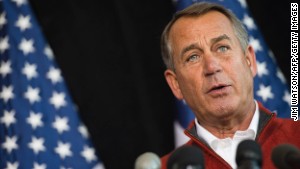 Boehner's 'about face' on immigration
Boehner's 'about face' on immigration 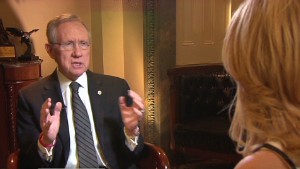 Reid: Dems shoudn't fear Obama
Reid: Dems shoudn't fear Obama So the election will be this: Us or them? Obamacare or no Obamacare? Do you like me better? Do you like government? Do you like poor people or rich people?
That's our debate -- the sum total of our big ideas right now. Not wanting to start any fights within your own party. Unity above all heading into the midterm elections.
So maybe Congress should just close up shop and leave town because nothing is going to happen for the next nine months. Just turn off the lights. Both parties are making the same political calculation for the same reason: They can't afford to have any internal debate lest they seem less than united against the enemy. Turns out that the permanent campaign is still alive and well.
Here's the glitch in this narrative: Voters, it turns out, actually want some solutions to problems. They want to see the deficit go down; they want to find a way to fix immigration. A majority (63%) is worried the country is on the wrong track. And, according to a new CBS/New York Times poll, eight in 10 Americans are fed up with Washington.
Somehow, voters haven't gotten the message that Congress -- in its steadfast intent to accomplish nothing -- is just trying to appeal to them.
But remember what happened to Mitt Romney's campaign. Romney lost for lots of reasons, but one of them was sticking too long to the assumption that if people were unhappy with the direction of the country and the other guy, that would be enough to win. It wasn't. The candidate mattered. And ideas mattered, too.
The "big" GOP idea this time is to bash Obamacare, relentlessly, endlessly, in a continual loop. Sure, it's unpopular, but what about if it starts working for people? What if people are sick of hearing about it now that the website is working? And what if people are more inclined to mend it than end it?
If Obamacare is the only trick in the bag, it might not be enough.
Then there's the Democrats' income inequality refrain. It's not new, it can work, and sure, it unites the Democrats. But by taking almost everything of substance off the table, it's the President's legacy and record of achievement that gets compromised, along with the voters.
The truth is this: It's a tight political fight. Polls right now show that the public, by a small 42%-39% margin, would back Republicans for office in the 2014 midterm elections. They're not thrilled with the President's job performance. They have soured on the President personally, and they can barely stomach the Congress.
So what's the political solution? No substance, no ideas, no serious debate that might actually engage voters. Each side suits up, armed with its slogans and its bromides.
And we inevitably re-elect the Congress we hate.
Follow us on Twitter @CNNOpinion.
Join us on Facebook/CNNOpinion.